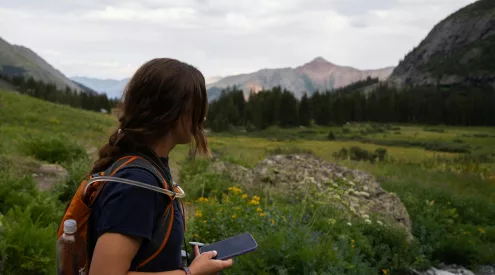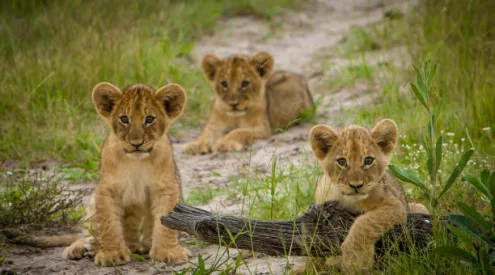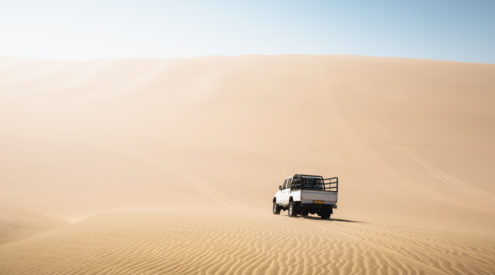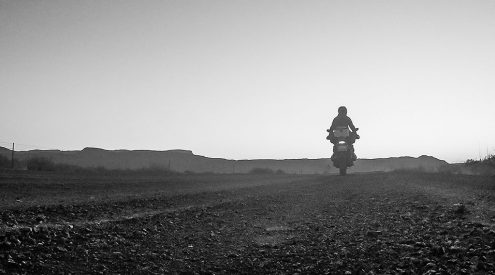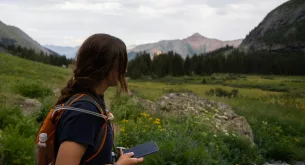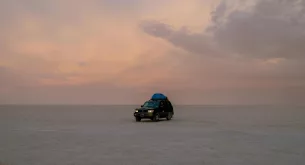Travellers will have even more ways to explore the barren beauty of Namibia with the launch of three new self-drive travel routes in June 2014.
When you think of Namibia vast deserts, free-roaming game and some of the world’s last remaining wilderness spring to mind. Namibia is a serious utopia for photographers, where cobalt-blue skies meet rich, orange sands in the kind of silence that leaves you speechless.
It’s an explorer’s paradise and anyone with a taste for adventure will be happy to know that they can now take advantage of even more ways to explore the barren beauty of this country.
In a development to diversify tourism in Namibia, the Millennium Challenge Account Namibia (MCA-N) funded the development of three new self-drive routes across the lesser-known areas of the country in conjunction with local non-profit organisation Open Africa and the Namibia Tourism Board, giving travellers the opportunity to discover some of Namibia’s best-kept secrets. The routes were developed to sustain and uplift local communities through tourism activity, meaning that anyone who chooses to visit these routes is supporting responsible travel that ultimately benefits the local conservancies and communities.
New self-drive routes in Namibia

A local Himba woman on the Arid Eden Route in Namibia. Photo by Charl Pauw of Open Africa
Arid Eden Route
The largest of the three new routes, the aptly named Arid Eden Route takes travellers on a journey from the coastal town of Swakopmund to the Angolan border in the north and includes the previously restricted western area of Etosha National Park, which can now be accessed by the public from the Galton Gate.
Along the route, you can check out well-known tourist attractions such as Spitzkoppe, Brandberg, Twyfelfontein, Epupa Falls and of course, Etosha National Park with its majesty of free-roaming animals, extreme landscapes and breath-taking geological formations.

Sunset along the Four Rivers Route. Photo courtesy of the Namibia Tourism Board
Fours River Route
The second of the routes, the Four Rivers Route, stretches from Nkurenkuru in the north east through the lush Zambezi region (formerly known as the Caprivi Strip) to the famous Victoria Falls and features an unusual water ecosystem that gives life to rich and rare wildlife, birds and culture. This wetland paradise was named after the river systems that flow through the area – the Zambezi, Okavango, Kwando and Chobe Rivers – and attracts visitors from far and wide each year.
Birders will enjoy spotting over 430 bird species, while other highlights include wildlife and numerous culturally rich villages and attractions such as the Mbunza and Mafwe Living Museums. These facilities help to sustain the livelihoods of local people while acting as traditional schools, preserving local culture and traditions. Those looking for a little bit more adventure can enjoy activities like fishing, birding, game-viewing and canoeing.

Taken on the Omulunga Palm Route. Photo courtesy of the Namibia Tourism Board
Omulunga Palm Route
The third and final route marries the Arid Eden Route to the lush water ecosystem of the Four Rivers Route. Stretching from Ruacana in the north-west to Nkurenkuru in the east, The Omulunga Palm Route is named after the distinctive palms known as Omulunga in the local Ovambo language. With vibrant colours, you’ll enjoy the sights and sounds of a real African town, lapping up the traditional and contemporary Ovambo culture and catching a glimpse of local tribal royalty. The area’s strong liberation history will fascinate history buffs while nature lovers can enjoy the abundant wildlife and wilderness in the world-famous Etosha National Park.
The new routes will officially launch at the Namibia Tourism Expo taking place in Windhoek from 4 – 7 June 2014.
For more information about these and other self-drive travel routes in Namibia visit www.openafrica.org or www.namibiatourism.com.na.




